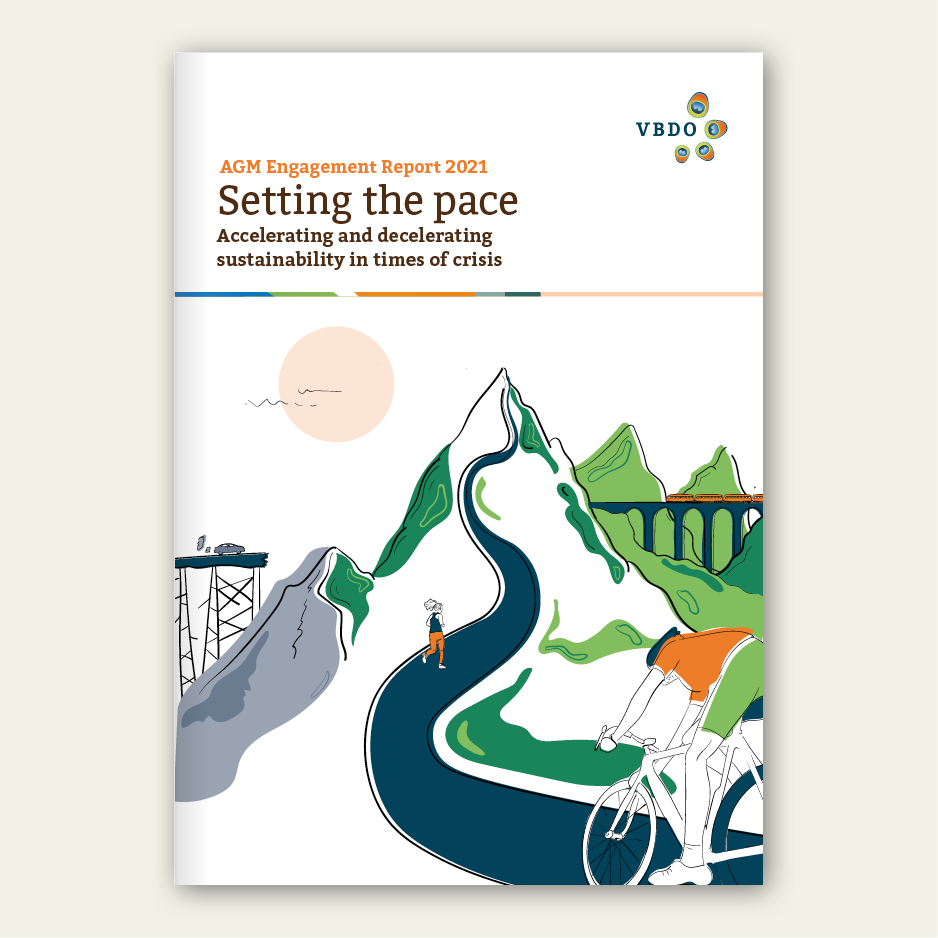Every year, the Dutch Association of Investors for Sustainable Development (VBDO) visits the shareholders’ meetings of the largest Dutch, stock-listed companies to obtain commitments on sustainable performance. This is based on extensive research into (non) sustainable performances of these companies. In total, 37 companies were approached and investigated, 139 questions were asked, and 59 commitments were made. The most important findings and commitments are presented in the AGM engagement report published today.
Lack of interaction at online shareholder meetings
Like last year, the shareholders’ meetings this year took place entirely online. Shareholders were therefore requested to submit their questions in advance. As a result, there was no real interaction during the meetings. For this reason, Eumedion, VEB and VBDO issued an appeal to the boards, requesting that shareholders are given the opportunity to ask questions live. “That call has been heard,” said Angelique Laskewitz, director of VBDO. “About a third of the companies we visited had people speaking live. This also helped when asking our own questions.”
Focus on three sustainable themes
These questions are focused on three themes over a period of several years, so the degree of progress can be determined in the research. This year, commitments for development were requested on the themes of climate change adaptation, working conditions along the chain and inclusion.
Companies are more aware of the risks of climate change
The report shows that Dutch listed companies are becoming more and more aware of the physical risks of climate change. In doing so, they are increasingly looking at how direct effects such as extreme rainfall, drought, sea level rise, and wildfires relate to, for example, the operational facilities. Unilever, RELX and Signify rose from the classification “learning” to leading” of the five leading companies in total.
21 companies, compared to 14 last year, have made this information public. “Reporting on this theme is essential,” says researcher Mart van Kuijk of VBDO. “By making data public, companies give shareholders and other stakeholders the opportunity for investigation and further discussion.”
Nearly a third of the companies now perform specific climate scenario analyzes related to, for example, their fleet, specific agricultural production regions, strategic assets, or their supply chain.
New EU law calls for more transparency in working conditions
In the latter category, almost 90% of the companies surveyed have made a formal commitment to improve working conditions. Nevertheless, transparency within this theme is still regularly lacking, as mentioned in the report.
For example, on the one hand, many companies have developed a Code of Conduct, with guidelines for suppliers, requiring compliance with certain rules of conduct. On the other hand, there are only a handful of companies that actually identify and address their impact within the chain. Even fewer companies actually report on the execution and outcomes of activities after assessing their suppliers.
“There is only a small group of companies that look beyond the cross-off boxes on the self-assessment of suppliers and have an eye for improving conditions. This really needs to change, especially in light of the upcoming European ESG legislation in which companies will become responsible for all practices in their supply chain,” says van Kuijk.
Motivate suppliers for a more sustainable performance
For the transition from a system that complies with legislation and regulations, to a continuous, proactive investigation within a chain, suppliers must be motivated and involved. That turns out to be quite a challenge. Maurice Loosschilder, Head of Sustainability at Signify, explains that for this reason a special program for suppliers has been created, based on selection- and rewards criteria, including sustainability performance.
“The better the performance, the higher the supplier scores and the more beneficial the relationship becomes for this supplier. For example, we offer them recognition with the Supplier Awards, invitations to innovation workshops, and shared management agendas. This clearly communicates to our suppliers that we take sustainability seriously, we are fully prepared to do our part and where possible help the supplier to improve.”
Diversity is more than gender
The situation for the theme of diversity and inclusion is comparable to that of working conditions in the chain. More than 90% of the companies have policies in place for preventing and reporting internal ethics or discrimination complaints, according to the report. In contrast, about a third of companies have comprehensive diversity and inclusion policies, which include all underrepresented groups. Only one in five companies assesses, communicates and addresses the differences in income between men and women, the so-called pay gap.
Van Kuijk emphasizes that diversity efforts should not be limited to gender only: “We still encounter companies that only have a gender policy for the board and that have never heard of the word inclusion. So, there are still steps to be taken.”
Webinar presentation of the report
On June 30th 2021, the AGM engagement webinar took place. You can find a recording of the event on this page.
Program
- Introduction by Angelique Laskewitz & Mart van Kuijk
- Engagement themes and sharing results
- Labour conditions in the Supply chain – Fidelity International – Terence Tsai on the Seafarer statement – human rights in global trade in times of a pandemic
- Human Rights & Raters – Elisabetta Colombo, SDGs Product Manager at V.E, Part of Moody’s ESG Solutions, will elaborate on the assessment of company’s human rights approach, a rater’s perspective
- Diversity – Robert Takken – Program Manager Diversity and Inclusion on PostNL’s approach and diversity index

